Five-card draw is a poker variant that is considered the simplest variant of poker, and is the basis for video poker. As a result, it is often the first variant learned by new players. It is commonly played in home games but rarely played in casino and tournament play. The variant is also offered by some online venues, although it is not as popular as other variants such as seven-card stud and Texas hold 'em.

Poker is a family of comparing card games in which players wager over which hand is best according to that specific game's rules. It is played worldwide, but in some places the rules may vary. While the earliest known form of the game was played with just 20 cards, today it is usually played with a standard deck, although in countries where short packs are common, it may be played with 32, 40 or 48 cards. Thus poker games vary in deck configuration, the number of cards in play, the number dealt face up or face down, and the number shared by all players, but all have rules that involve one or more rounds of betting.
Pai gow poker is a version of pai gow that is played with playing cards, instead of traditional pai gow's Chinese dominoes. The game of pai gow poker was created in 1985 in the United States by Sam Torosian, owner of the Bell Card Club.

Five-card stud is the earliest form of the card game stud poker, originating during the American Civil War, but is less commonly played today than many other more popular poker games. It is still a popular game in parts of the world, especially in Finland where a specific variant of five-card stud called Sökö is played. The word sökö is also used for checking in Finland.

Texas hold 'em is the most popular variant of the card game of poker. Two cards, known as hole cards, are dealt face down to each player, and then five community cards are dealt face up in three stages. The stages consist of a series of three cards, later an additional single card, and a final card. Each player seeks the best five-card poker hand from any combination of the seven cards: the five community cards and their two hole cards. Players have betting options to check, call, raise, or fold. Rounds of betting take place before the flop is dealt and after each subsequent deal. The player who has the best hand and has not folded by the end of all betting rounds wins all of the money bet for the hand, known as the pot. In certain situations, a "split pot" or "tie" can occur when two players have hands of equivalent value. This is also called "chop the pot". Texas hold 'em is also the H game featured in HORSE and HOSE.
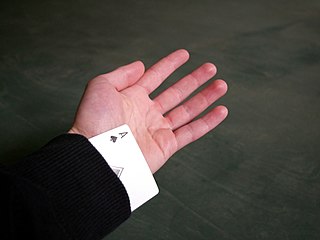
Cheating in poker is any behavior outside the rules of poker that is intended to give an unfair advantage to one or more players.
Second dealing is a method of manipulating a deck of cards during a card game by way of dealing the second, rather than the top card of the deck, usually for the purpose of cheating. Second dealing and bottom dealing are also used in performance magic.
Razz is a form of stud poker that is normally played for ace-to-five low. It is one of the oldest forms of poker, and has been played since the start of the 20th century. It emerged around the time people started using the 52-card deck instead of 20 for poker.

Cardistry is the performance art of card flourishing. Unlike card magic, cardistry is meant to be visually impressive and appear very hard to execute.
Cheating in casinos refers to actions by the player or the house which are prohibited by regional gambling control authorities. This may involve using suspect apparatus, interfering with apparatus, chip fraud or misrepresenting games. The formally prescribed sanctions for cheating depend on the circumstances and gravity of the cheating and the jurisdiction in which the casino operates. In Nevada, for a player to cheat in a casino is a felony under state law. In most other jurisdictions, specific statutes do not exist, and alleged instances of cheating are resolved by the gambling authority who may have more or less authority to enforce its verdict.
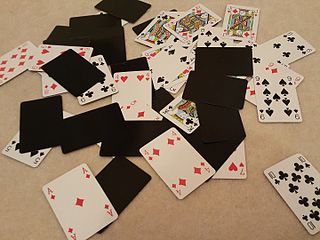
52 pickup or 52-card pickup is a humorous prank which consists only of picking up a scattered deck of playing cards. It is typically played as a practical joke, where the "dealer" creates the false impression that a legitimate game will be played, then simply throws the entire deck into the air so the cards land strewn on the floor and instructs other players to pick them up.
Bottom dealing or base dealing is a sleight of hand technique in which the bottom card from a deck of playing cards is dealt instead of the top card. It is used by magicians as a type of card illusion, and by card sharps and mechanics, and as a method of cheating in poker or other card games.
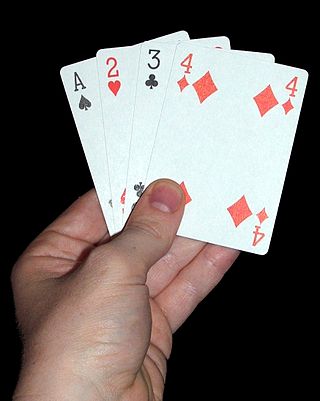
Badugi is a draw poker variant similar to triple draw, with hand-values similar to lowball. The betting structure and overall play of the game is identical to a standard poker game using blinds, but, unlike traditional poker which involves a minimum of five cards, players' hands contain only four cards at any one time. During each of three drawing rounds, players can trade zero to four cards from their hands for new ones from the deck, in an attempt to form the best badugi hand and win the pot. Badugi is often a gambling game, with the object being to win money in the form of pots. The winner of the pot is the person with the best badugi hand at the conclusion of play. Badugi is played in cardrooms around the world, as well as online, in rooms such as PokerStars. Although it hasn’t had its own tournament per se at the WSOP, it is featured in the Dealers Choice events as well as in the Triple Draw Mix. The 2023 WSOP event does have a Badugi tournament scheduled.

A poker dealer distributes cards to players and manages the action at a poker table.
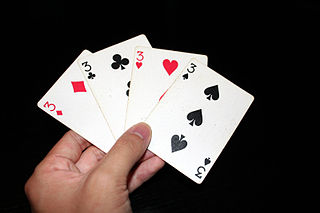
Continental Rummy is a progressive partnership Rummy card game related to Rumino. It is considered the forerunner of the whole family of rummy games using two packs of cards as one. Its name derives from the fact that it is played throughout the continental Europe, the United States, Mexico, Canada, and also in South America. According to Albert Morehead, it was "at one time the most popular form of Rummy in women's afternoon games, until in 1950 it lost out to Canasta."

In card games, hole carding is the obtaining of knowledge of cards that are supposed to be hidden from view. The term is usually applied to blackjack but can apply to other games with hidden hole cards, like three card poker and Caribbean stud poker. So long as it does not involve the use of a device like a mirror, actions like touching the dealer's cards, or having another person read and signal the hole card, in most jurisdictions hole carding is a legal form of advantage gambling. In some games, like stud poker, casinos normally have rules against rubbernecking or having a confederate stand behind an opponent to signal hole cards.
The following is a glossary of poker terms used in the card game of poker. It supplements the glossary of card game terms. Besides the terms listed here, there are thousands of common and uncommon poker slang terms. This is not intended to be a formal dictionary; precise usage details and multiple closely related senses are omitted here in favor of concise treatment of the basics.
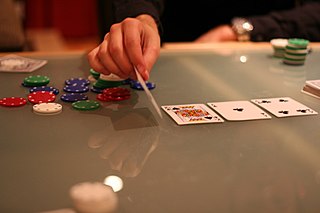
Community card poker refers to any game of poker that uses community cards, which are cards dealt face up in the center of the table and shared by all players. In these games, each player is dealt an incomplete hand face down, which are then combined with the community cards to make a complete hand. The set of community cards is called the "board", and may be dealt in a simple line or arranged in a special pattern. Rules of each game determine how they may be combined with each player's private hand. The most popular community card game today is Texas hold 'em, originating sometime in the 1920s.

Open-face Chinese poker, OFCP, commonly known as Open Face Chinese or OFC, is a variant of Chinese poker where players receive five cards to start and then one card at a time until each player has a 13 card hand legal or not. The game originated in Finland during the mid-2000s and spread to Russia a few years later. Professional poker player Alex Kravchenko, who is credited with introducing the game to the Russian high-stakes community, describes the game as "spreading like a virus". The game was introduced to the United States in 2012.












